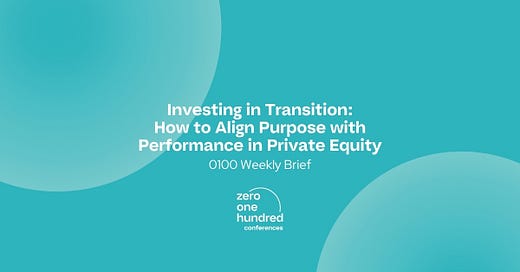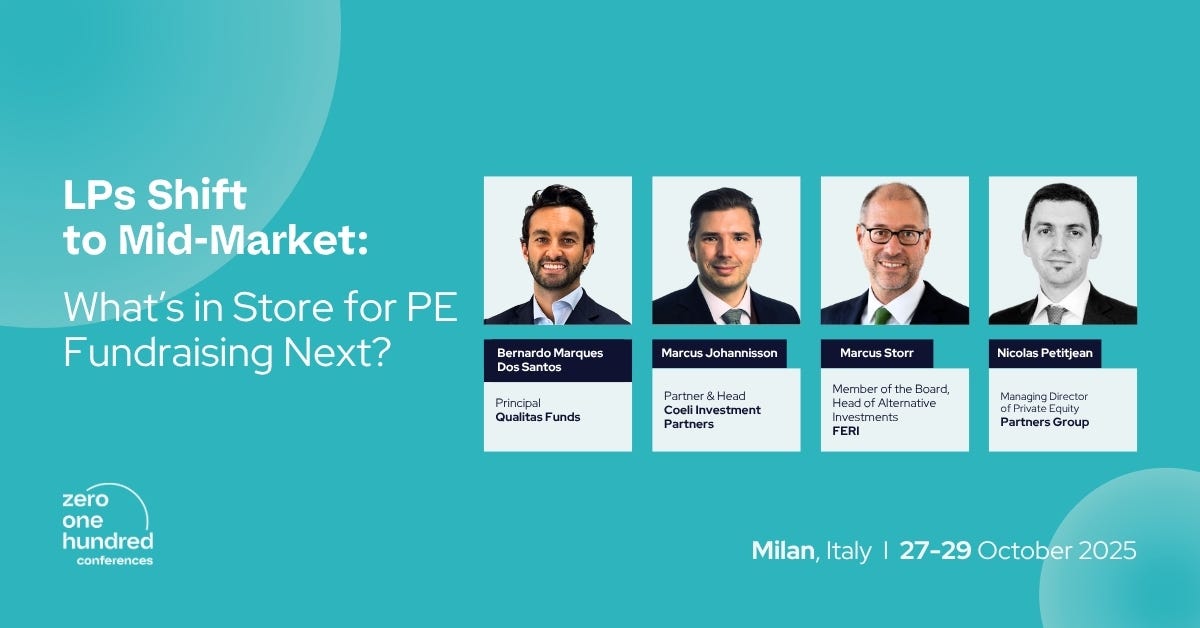Investing in Transition - How to Align Purpose with Performance in Private Equity – 0100 Weekly Brief
Hello, there!
Today, there’s growing pressure and opportunity to align investment performance with long-term purpose. This is why in today’s newsletter, we’ll be taking a look at what we’re calling “Investing in Transition”, which could be energy, societal, or, as Marc Romano from Mirova mentioned a few months ago during our podcast talk, “Biodiversity Transition”.
It’s about more than just ESG checkboxes. It's about putting capital to work in companies and sectors that are driving real, measurable change—whether that’s in clean energy, digital infrastructure, healthcare innovation, or sustainable manufacturing.
Why now?
Investor interest is rising. High-net-worth families and institutions are increasing their allocations to private equity, especially funds focused on impact and transition themes.
Fundraising and dealmaking show signs of recovery. Q1 2025 saw a 45% growth in deal volume versus a year ago, and global PE deals reached their highest value since mid‑2022.
Transition-themed PE is thriving. Funds like Verdane’s €700M energy-transition vehicle aim for 25% IRR while reducing CO₂ emissions, proof that impact-driven strategies can deliver strong returns.
More importantly, what could be more real than the transition itself? The only way forward is step by step. We can’t expect to shift from fossil fuels to low-carbon and renewable energy sources overnight—this will take decades, if not longer. That’s why we need to direct our capital and attention toward the solutions that will truly pave the way.
Meanwhile, Europe’s middle-market private equity funds have raised €41.8 billion (about $47.6 billion) so far this year, according to Pitchbook, and it’s already reaching 68% of last year’s total. The interesting fact here is that capital is being concentrated into fewer hands, with only 39 funds closed as of May 30.
We are now looking toward larger vehicles and more selective fund manager backing, as institutional investors place bigger bets on proven teams and transition-focused strategies.
Still, not all investors are holding steady. Yale University,—long regarded as a trailblazer in private equity investing—is reportedly in the process of selling off nearly $8 billion worth of PE stakes. Why? A combination of rising pressure to deliver liquidity, political scrutiny (including pressure from President Trump on Ivy League schools), concerns over private equity valuation practices, and a tougher fundraising environment is prompting even the most sophisticated institutional investors to reassess their exposure, according to this New York Times article, a highly recommended reading for anyone tracking these topics.
All of the above raises a key question at the heart of today’s newsletter:
How can investors stay engaged in private equity while dealing with market risks and growing demand for measurable impact?
Let’s take a closer look at how this transition is unfolding and how private equity can continue to drive both performance and meaningful change.
🎧 Podcast Spotlight | Investing in Societal Transition
It’s been a while since we recorded this episode, but it is a must. By the way, just a few weeks ago, Natixis Investment Managers—Mirova’s parent company—announced a strategic merger project between its sustainability- and thematic-focused affiliates, Mirova and Thematics Asset Management. The goal is to create a unique offering that combines innovation and positive impact, positioning the new entity as a major player in thematic management worldwide.
In our conversation, Marc Romano, Head of Impact Private Equity Funds at Mirova, discusses how private equity can be an instrument for addressing social and environmental challenges. With a background in leading financial institutions like Rothschild & Co, Schroders, and AXA, Marc brings a strong investment perspective to the evolving world of impact finance.
In this episode of 0100 Impact Talks, Marc outlines Mirova’s mission to support both environmental and societal transition through investment. Marc also shares insights into Mirova’s second fund, Impact Life Essentials, which targets startups focused on healthcare access, education, sustainable consumption, and inclusive services—all with the goal of creating long-term social impact in Europe.
Key insights from the episode:
Filling a critical funding gap – Europe has strong support for early-stage startups and large buyouts, but often lacks capital for companies in the growth or “acceleration” phase. Mirova’s funds are designed to bridge that gap.
A dedicated focus on social impact – Mirova’s Impact Life Essentials fund is one of the few private equity funds exclusively targeting societal issues like aging, education, and fair consumption. The goal: help proven, innovative companies scale across Europe.
Why Europe matters – Europe still trails the U.S. in innovation investment, but is gaining ground, especially in cleantech. Mirova is helping build a stronger investment culture for European innovation and social progress.
📝 Expert Round-up | Mid-Market PE Success
Vahit Alili, Senior Investment Director at Schroders Capital, shares his perspective on how Fund-of-Funds (FoF) and co-investment strategies are helping investors access high-quality opportunities in Europe’s mid-market private equity space.
He also points out the evolving investment environment in the DACH region, the value of working with specialist fund managers, and how co-investing, when done with the right alignment, can strengthen returns and portfolio diversification.
Key takeaways from the article:
Opportunities in DACH – The DACH region is becoming more receptive to private equity, with a new generation of entrepreneurs in sectors like software, renewables, and industrial technology open to partnerships.
Importance of specialist managers – Sector-focused GPs, particularly in software and healthcare, have shown stronger long-term performance. DACH presents room for growth in healthcare-focused buyouts.
Why Fund-of-Funds and co-investments matter – These approaches help investors access niche, sub-€2B funds and primary buyouts with better risk/reward profiles—segments often hard to reach directly.
Co-investment best practices – Strong GP relationships, shared underwriting, and aligned incentives are essential. In the DACH region, there’s room for more active collaboration between GPs and co-investors.
🗓️ Investing in Transition at 0100 DACH: New Speakers Join the Discussion on Mid-Market Momentum & Fundraising Trends
One of the key discussions at the upcoming 0100 International will focus on how Limited Partners (LPs) are adapting their investment strategies amid evolving private equity dynamics.
This panel - “LPs Shift to Mid-Market: What’s in Store for PE Fundraising Next?” - will explore the increasing momentum behind mid-market funds, driven by shifting valuations, leaner deal structures, and a more flexible investment landscape. Here is who’s joining us on stage:
We’re pleased to welcome Bernardo Marques Dos Santos, Principal at Qualitas Funds. Bernardo leads investments across Southern Europe and the United States, bringing deep experience in cross-border dealmaking. Before joining Qualitas, he worked in strategy consulting at Bain & Company, where he played a key role in private equity advisory services across various sectors and geographies.
Also joining is Marcus Johannisson, Partner and Head of Coeli Investment Partners. Marcus has spent over 16 years building Coeli’s private equity platform and is a well-known name in the Nordic investment space. He focuses on long-term value creation, platform innovation, and investor alignment—critical themes in today's market.
We’ll also hear from Marcus Storr, Member of the Board and Head of Alternative Investments at FERI. With over 30 years of experience in hedge funds, private equity, and portfolio strategy, Marcus brings unmatched insight into alternative asset allocation. A frequent contributor to industry journals, he is a respected voice in Germany’s private markets.
Rounding out the panel is Nicolas Petitjean, Managing Director of Private Equity at Partners Group. Based in Zug, Nicolas oversees direct and co-investment strategies, bringing nearly two decades of experience in M&A and private equity across Europe. He’s a key figure in shaping the firm’s global partnership investment strategy.
More speakers to be announced soon!
🌍 Across the Ecosystem | What’s Driving the Transition in Private Equity?
Across Europe, institutional investors, fund managers, and policymakers are actively rethinking how private equity can deliver both strong returns and long-term impact.
From the rise of specialist GPs to increased LP interest in co-investments and Fund-of-Funds strategies, the industry is entering a new phase, focused on value creation, sustainability, and better capital allocation.
Here’s a look at key developments and conversations shaping the future of private equity across the ecosystem:
📚 Report | Leaning Into the Turbulence: Private Equity Midyear Report 2025
The 2025 Private Equity Midyear Report by Bain & Company paints a picture of an industry under pressure. Due to geopolitical uncertainty and trade-related shocks, firms are being compelled to reassess how they create value, manage risk, and remain relevant.
The reality echoes our theme of investing in transition, where performance needs purpose for a good, long-term strategy.
Key insights from the report:
Mid-market and impact-focused funds may have an edge as large-cap dealmaking slows. In Q2, deal value fell 24% and count dropped 22% due to tariff-related volatility.
Transition means rethinking the value creation playbook. From pricing discipline to AI-enabled cost control, GPs are being pushed to show real, measurable progress. Operating leverage and refreshed growth strategies are becoming must-haves, not nice-to-haves.
Liquidity is becoming a defining issue. LPs are pushing for full exits—even at discounted valuations—to regain capital. As a result, secondaries are growing, but they still account for <5% of global AUM, which is insufficient to solve the broader liquidity crunch.
📚 Report | Europe’s Private Markets Embrace Impact, Surpassing €190B
Europe’s private impact investing market has reached a record €190 billion, according to the European Impact Investing Consortium’s report from last year. Institutional investors, particularly pension funds, insurance firms, and development finance institutions, now account for 28% of total AUM, reflecting a growing appetite for aligning financial returns with measurable social and environmental outcomes.
Venture capital and private equity remain central, accounting for nearly 40% of total impact AUM, with increasing contributions from real assets, such as social housing and outcomes-based contracts.








